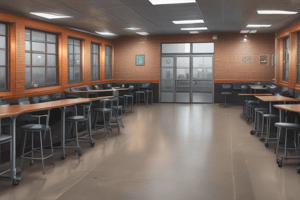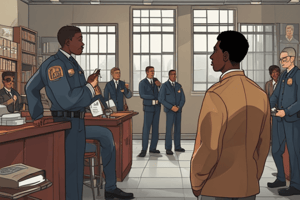Podcast
Questions and Answers
What is a primary role of a Juvenile Detention Officer (JDO)?
What is a primary role of a Juvenile Detention Officer (JDO)?
Which of the following is NOT a responsibility of a Juvenile Detention Officer?
Which of the following is NOT a responsibility of a Juvenile Detention Officer?
What is a cornerstone of a Juvenile Detention Officer's work?
What is a cornerstone of a Juvenile Detention Officer's work?
In crisis situations, what technique may JDOs use to help calm juveniles down?
In crisis situations, what technique may JDOs use to help calm juveniles down?
Signup and view all the answers
Which professional group do Juvenile Detention Officers collaborate with to develop treatment and rehabilitation plans?
Which professional group do Juvenile Detention Officers collaborate with to develop treatment and rehabilitation plans?
Signup and view all the answers
Apart from supervision, what is another key role of a Juvenile Detention Officer when working with juveniles?
Apart from supervision, what is another key role of a Juvenile Detention Officer when working with juveniles?
Signup and view all the answers
What is a key responsibility of Juvenile Detention Officers in the juvenile justice system?
What is a key responsibility of Juvenile Detention Officers in the juvenile justice system?
Signup and view all the answers
What is a key strategy for managing conflicts and avoiding negative outcomes?
What is a key strategy for managing conflicts and avoiding negative outcomes?
Signup and view all the answers
Which of the following is NOT a recommended communication technique for de-escalation?
Which of the following is NOT a recommended communication technique for de-escalation?
Signup and view all the answers
What role does active listening play in de-escalation?
What role does active listening play in de-escalation?
Signup and view all the answers
How can maintaining eye contact contribute to de-escalation?
How can maintaining eye contact contribute to de-escalation?
Signup and view all the answers
In conflict resolution, what does staying calm help prevent?
In conflict resolution, what does staying calm help prevent?
Signup and view all the answers
Why is it important to avoid unnecessary details in communication during conflict?
Why is it important to avoid unnecessary details in communication during conflict?
Signup and view all the answers
What is a key component of effective conflict resolution?
What is a key component of effective conflict resolution?
Signup and view all the answers
Why is it important to avoid interrupting a speaker during communication?
Why is it important to avoid interrupting a speaker during communication?
Signup and view all the answers
What is a recommended approach to understanding the speaker's perspective?
What is a recommended approach to understanding the speaker's perspective?
Signup and view all the answers
Why is it important to establish ground rules during a conflict?
Why is it important to establish ground rules during a conflict?
Signup and view all the answers
What role does crisis management play in preventing conflicts?
What role does crisis management play in preventing conflicts?
Signup and view all the answers
How can focusing on the future benefit conflict resolution?
How can focusing on the future benefit conflict resolution?
Signup and view all the answers
Study Notes
Juvenile Detention Officers: Supporting the Development and Rehabilitation of Young People
Juvenile Detention Officers (JDOs) serve a vital role within the juvenile justice system, working with minors who have come into contact with the law. Their responsibilities extend beyond simple guardianship to include the promotion of safety, well-being, and rehabilitation of the juveniles in their care.
Responsibilities of a Juvenile Detention Officer
Juvenile Detention Officers act as mentors, guides, and often enforcers. Their primary roles include:
- Supervising and overseeing the activities of juveniles in detention facilities.
- Ensuring the safety and well-being of the juveniles in their care.
- Maintaining discipline within the detention facility.
- Providing support and guidance to help juveniles address their behavioral issues and develop positive coping strategies.
- Collaborating with other professionals, including social workers, psychologists, and teachers, to develop and implement treatment and rehabilitation plans.
Crisis Intervention with Juveniles
Crisis intervention is a cornerstone of JDOs' work. They are trained to recognize, assess, and respond to crisis situations in juveniles, using techniques such as:
- De-escalation strategies to calm a juvenile during a crisis.
- Active listening techniques to help juveniles express their emotions and concerns.
- Conflict resolution skills to address the root causes of behavioral issues.
- Referral to appropriate resources and services, such as mental health professionals or substance abuse counselors.
Crisis intervention is not just about responding to a specific crisis event; it's also about building long-term relationships with juveniles to help them develop coping skills and self-regulation strategies.
The Juvenile Justice System
The juvenile justice system is designed to address the unique needs of young people and emphasize rehabilitation and reintegration into society. JDOs play a critical role in the system, working to:
- Foster positive relationships between juveniles and their families.
- Provide support and guidance to help juveniles develop positive behaviors and life skills.
- Connect juveniles with resources and services to address their needs and reduce recidivism rates.
- Collaborate with other professionals to develop and implement treatment and rehabilitation plans.
Juvenile Detention Officers work to support juveniles, both during their time in detention and after they've been released. They play a vital role in the juvenile justice system, helping young people develop the skills and resilience they need to lead successful lives.
In conclusion, Juvenile Detention Officers are more than just guards; they are mentors, guides, and advocates for the young people in their care. Their work is essential to the juvenile justice system, helping juveniles develop the skills and resilience they need to lead successful lives. Through crisis intervention, long-term relationships, and collaboration with other professionals, JDOs help juveniles address their behavioral issues and reintegrate into society.
Studying That Suits You
Use AI to generate personalized quizzes and flashcards to suit your learning preferences.
Description
Test your knowledge on the roles and responsibilities of Juvenile Detention Officers in supporting the development and rehabilitation of young people within the juvenile justice system. From crisis intervention techniques to collaborating with other professionals, this quiz covers various aspects of JDOs' important work.






